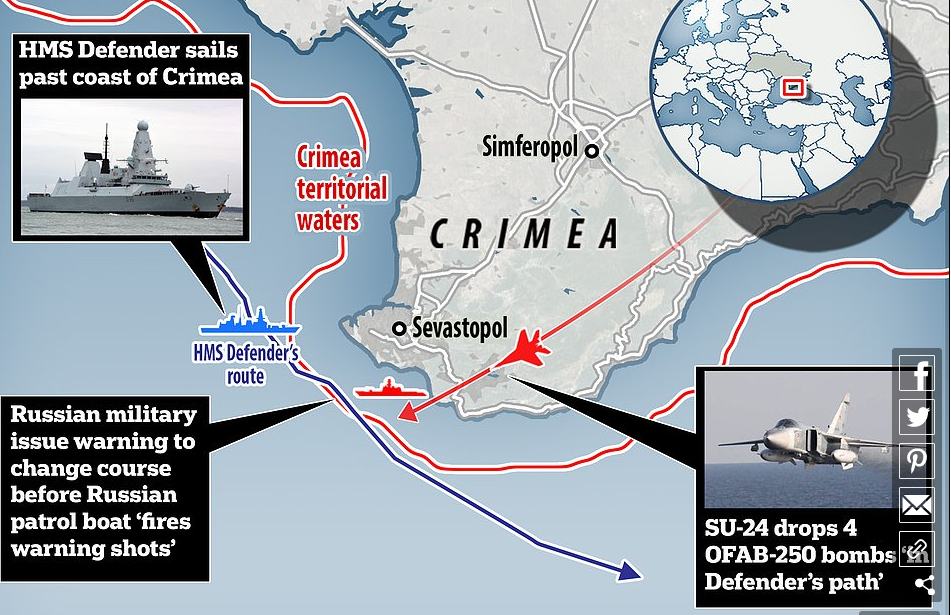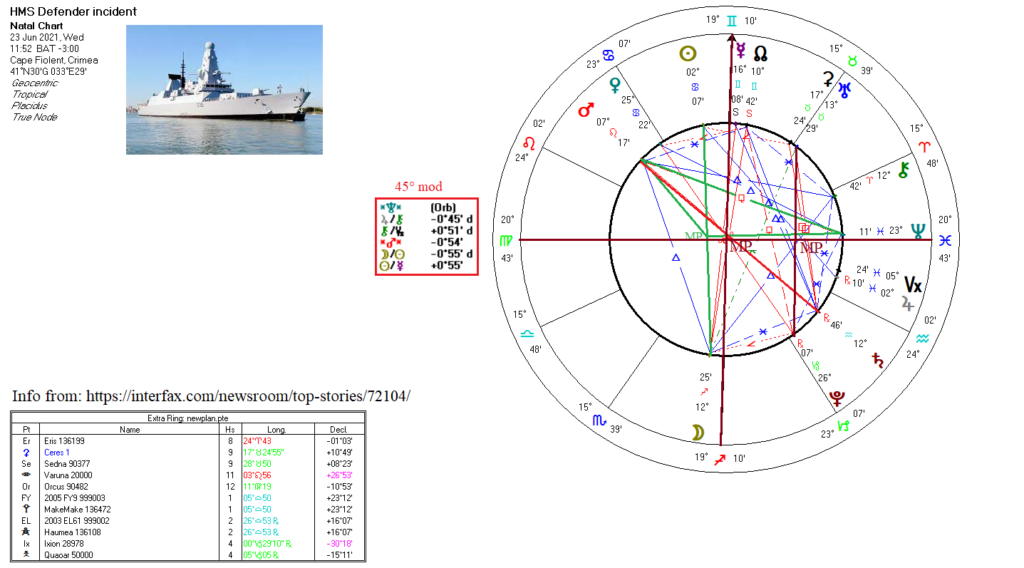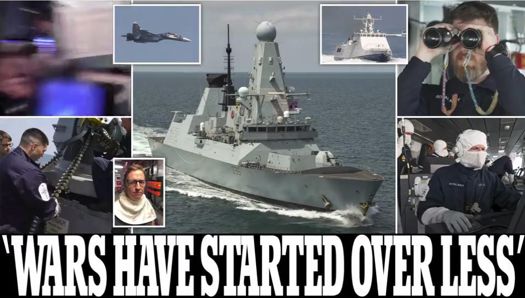The day before the full moon, on 23 Jun 2021, the British warship HMS Defender crossed into disputed waters off the coast of Crimea. To the Russians, there is no dispute about whose waters those are. But to the Western world at large, at least publicly, Russia is an occupying force on Ukrainian territory. To hear the British side of the story in their media, the Defender was practising freedom of navigation innocently in Ukrainian waters at the behest of Ukraine. The truth is, the incident was a propaganda exercise to be used against Russia. We will examine the incident and its meanings and ramifications here, along with the astrology, of course.
The Defender incident was a military exercise, codenamed “Operation Ditroite”. That in itself tells us this was hardly an ‘innocent’ passage near the Crimean coastline. Regardless of whether or not the UK recognizes the secession of Crimea to Russia from Ukraine as legitimate or not, international maritime law spells out the case: Russia acted lawfully in expelling the Defender from the area, which by the way was very close to the Russian Black Sea naval base at Sevastopol.
Here is the background for the various arguments. Whether or not Crimea is recognized as Russian territory, it has control of the peninsula. Whether an occupying or a legitimate power, it has the legal right to control the passage of ships through the territorial waters of Crimea in times of conflict, as currently exists between Ukraine and Russia:
“Occupation also extends to the occupied State’s territorial waters (internal waters and territorial sea) to the extent that effective control is established over the adjacent land territory. Under the law of armed conflict, the occupant may take measures to ensure “public order and safety” in the occupied territory, including its territorial waters. In particular, the occupying Power may take measures “to ensure the security of the Occupying Power, of the members and property of the occupying forces or administration, and likewise of the establishments and lines of communication used by them.” Under the laws of armed conflict, the occupying power has the right to suspend in all or in parts of the territorial sea of the occupied territory the innocent passage of foreign ships, if it considers it necessary for imperative reasons of security.”
That is the legal argument, and the quoted material was written several weeks before the incident. Other nations have also used the same precedent, notably the US regarding Guantanamo and Iraq. So, for Boris Johnson to claim the Defender was acting innocently and in line with freedom of navigation is false. The ship was locked and loaded when it left Odessa, had journalists on board to document the event and was clearly testing the Russian response. But because the stunt failed, the British press denied the Defender was forced to leave the restricted areas and quickly tried to paint the event as Russian aggression, which was probably the point all along. So before we go further with the fallout from the incident, the following gives the timing and description of events:
“The British Navy destroyer HMS Defender operating in the northwestern part of the Black Sea crossed the state border of the Russian Federation at 11:52 a.m. on June 23 of this year and entered the territorial sea in the area of Cape Fiolent, moving three kilometers inside,” the ministry said.
A border patrol ship fired warning shots at 12:06 p.m. and 12:08 p.m. Later on, at 12:19 p.m., a Su-24M aircraft dropped bombs (four OFAB-250 high explosive fragmentation bombs) as a warning on the course of HMS Defender, the ministry said.
“As a result of joint actions of the Black Sea Fleet and the Border Service of the Russian Federal Security Service, HMS Defender left the territorial sea of the Russian Federation at 12:23 p.m.,” the ministry said.
Here is a map of the incident (bigger):

The incident started, then, when the Defender went inside Russian waters. The chart for the incident is below (bigger):

Neptune is the clear standout in the chart, conjunct the Descendant, the latter ruling the offending party in any conflict and open conflicts in general. Neptune rules the seas and oceans, and in this case also rules naval commanders – admirals and the admiralty. It also shows the deceptive nature of the operation and its use as a propaganda stunt. But further on from that, the midpoints formed by Neptune are also rather telling. We have the following; Nep=Sun/Moon, and Mars=Sun/Moon.
From the preceding midpoints, the Mars midpoint shows the militant and aggressive nature of the event (by 45° modulus): “The urge to bring to fruition ideals and wishes, the realisation of joint objectives.” There were in fact joint objectives – between Ukraine and the UK, and behind the scenes from Washington and the other two states. That midpoint is also one that can indicate marriage and conception of children in a relationship horoscope. But in this case, it formed a 45° modulus (hidden midpoint) with the main midpoint, Nep=Sun/Moon. The latter midpoint, being near the Descendant, is revealing:
“Inner discontentment, the tendency to torment oneself, the disposition to get upset quite easily. – Shared suffering, mistakes, misunderstandings, illusions or deceptions, the undermining of associations.”
However, there is another powerful midpoint: Ura/Plu=Asc/MC. This is our ‘revolution midpoint’, (Ura/Plu) which can bring sweeping changes with it. To the Ascendant, we have: “Being placed in an unusual or restless environment. – Applications of force, an accident.” Coupled with the MC, we have: “Restlessness, indefatigability, prudence, vision, aspirations for innovations and reforms, mobility, the instant grasp and exploitation of every situation.” The latter may sound positive and that it was calculated to bring maximum value for the British.
But the preceding, coupled with the Neptune and Mars midpoints, shows the Ascendant influence more than the MC. It shows the bolded points regarding the MC=Ura/Plu midpoint. That, then, is further hooked in with the Mars/Saturn opposition, showing overconfidence and the possibility of a fall. It is an aspect that is famous for showing bad judgement and corresponding missteps and falls from grace. The latter is what the stunt produced for the British MoD. Now the British government is in damage control, further exacerbated by the ‘leaked’ (or perhaps we should say, ‘leaked all over’) report that was found in a trash bin behind a bus stop – rather appropriate symbolism, we might surmise.
Were the records real or fabricated? That is a question to ask. Why would a government official go to a bus stop, let alone ‘inadvertently’ or ‘mistakenly’, even ‘absent-mindedly’ leave secret government records there? The records could have been produced in a few hours by someone with a modicum of computer and graphic arts skills. And then, some patriotic person, seeing they are secret government documents, turns them over to the BBC – a media organization? Why not turn them in to the authorities, the police at least? This satchel full of government records appears to be a plant, not very real, and an amateurish attempt to cover something, or to make the British government look worse than it already looks.
The records left at the bus stop clearly state the perpetrators of ‘Op Ditroite’ were more concerned about the Russian reaction than anything else (machine translate). They expected a strong reaction, and they got what they expected. It would appear that the UK is more worried about its image in the world than about ‘having a go’ at Russia. It certainly has no military might in comparison with Russia and their prestige is not what it was. As Craig Murray recently stated on the matter:
“The UK needs to lose its imperial delusions. Sending gunboats to the Crimea is as mad as – well, sailing an aircraft carrier expressly to threaten the Chinese. There are those who see this activity as evidence of the UK’s continued great power status. I see it as evidence of lunacy.”
We can probably expect to see quite a bit of Russophobic nonsense coming out of this episode, along with more sanctions. The latter is also probably a prime reason the Defender was sent into possible harm’s way. If the British wanted to look tough, the stunt backfired on them.
In a recent Cross Talk episode, to quote an old saying, “A fish rots from the head downward,” referring to British government antics recently, as in the past 18 months. The Russian-speaking world recognizes this too (machine translate), especially amplified when the ‘secret documents’ were found at the bus stop. With all the denials by the British, what really happened when the Defender entered Russian waters? From the link preceding:
On Wednesday, more than 20 Russian aircraft and two coast guard ships followed the warship as it sailed about 12 miles (19 km) off the coast of Crimea.
“The Moscow Defense Ministry said the patrol ship fired warning shots and the jet dropped bombs in the path of the destroyer, but the UK government rejected this theory, denying that any warning shots had been fired.”
This was actually videoed. There is no denying what really happened. For their part, the Russians knew everything that was going on in the theater of operation, even down to the number on the tail of the American aircraft, and they knew what it was about. They had no worries about what was transpiring, even if they had sunk the Defender. The event took place two days after the British and Ukrainians signed a deal that will see the UK build ships and naval bases for Ukraine. Al the while this was happening there was a US spy plane monitoring the proceedings. Clearly there was cooperation between the US and UK on this exercise. And Ukraine is to be a part of the NATO war games in the Black Sea, Exercise Sea Breeze 2021, taking place now.
The Russians clearly stated after the fact that the next time such an incident occurs, if it does, they will open fire directly at the ship(s). They would, for example:
“Most likely, [the Russians] will open fire, but first only with small-caliber naval artillery (30-mm from the Russian border patrol ship or even 76-mm), and that fire will be aimed at the propeller-steering group (i.e. at the stern) to begin with. At the same time, the coastal defense batteries will actively track the intruder with their targeting radar, plus the Russian will “hang” 15-20 Su-24 and SU-30SM in immediate readiness to use more serious means – for example, the supersonic (M = 3.5) anti-radiation X-31 and take out the mast with its radar. That is just for starters…”
And now, maybe for propaganda purposes or just sheer hard-headedness, it was recently announced the USS Ross was going to take the exact route of HMS Defender in the Sea Breeze exercises. The establishment in the US and UK apparently don’t know what else to do except to double down on failed tactics. There will be ships from 30 countries involved in the Sea Breeze exercises, all fat targets (machine translate) in the Black Sea and Mediterranean, should the Western powers decide they want to tempt fate or poke at the Bear once again.
Returning to the Defender incident, Craig Murray again summarizes the true British position on the matter succinctly:
“The legality of the British action is, at very best, moot. In realpolitik, it is an act of brinkmanship with a nuclear power and further effort to ramp up the new Cold War with Russia, to the benefit of the military, security services and armaments companies and the disbenefit of those who need more socially useful government spending. It is further an act of jingoist populism for the neo-liberal elite to distract the masses, as the billionaires’ incredible wealth continues to boom.”
We trust the Sea Breeze exercises, which go for a month, will not produce similar or any such events. But there are a few wider reasons as to why the incident took place at all, and these go to British domestic politics and US-EU relations.
At the Putin-Biden summit there was talk of the desire to find a balance of ‘strategic stability’ between the US and Russia. This especially applied to nuclear weapons and Russia’s new weapons systems. The administration was hoping to buy itself time to catch up or to at least re-think its policies regarding defense and Russia. No sooner had the summit finished, then Macron and Merkel called for their own summit with Putin. This horrified the Baltic States (B3), Poland and Ukraine, who want to see maximum pressure kept up on Russia by the US and EU.
Britain, too, has its reasons for wanting to see Russia held in check or, better yet, weakened. Their plans fit with the B3 and Poles, all of those being NATO members, and with Ukraine wanting membership in NATO. Most of their reasoning for antagonism toward Russia lies in the past (think: Cold War, WWII and so forth) and in financial reasons. These states know that if a strong economic union arises between the Russians and the Germans especially, along with France, Italy and Spain, then the B3 and Poles will fade in significance and financial wherewithal.
Merkel and Macron called for their summit with Putin shortly after the Putin-Biden summit, but it was soundly rejected by the EU leaders on the 25th, mainly from objections by the aforementioned states. The EU is a divided body when it comes to EU-Russia relations. And any moves toward easing of relations with Russia is held hostage by those states. The EU has dug itself into a hole by prematurely – if at all – admitting the ex-Soviet satellite states into the EU. That also applies to NATO membership.
The dysfunctional dynamics of the EU were recently discussed on CrossTalk, with the EU being currently in a stalemate, between the German, French and Italian bloc and the eastern states of the EU. The UK used to be a major hurdle to Russia-EU relations, too, but they are no longer in the bloc. Still, they wield power in the EU via their NATO membership, and this was demonstrated in the Defender incident, which drove the final nail into the Macron-Merkel initiative.
The EU is further divided into the ideologues and the business interest camps, with the ideologues being staunchly anti-Russian, while the business community wants to bring EU-Russia relations back to pre-2014 status. That would mean forgetting about Crimea as a factor in EU-Russia relations, giving de facto recognition that Crimea is Russian territory. Sanctions against Russia since 2014 have hit Italy and Spain particularly hard due to sanctions against exporting farm products to Russia.
In summary, the Defender incident can be seen in several respects – as a bone-headed miscalculation, as a means to keep Germany and France in line with the EU-NATO fold, and as an alleged justification for more NATO spending, all the while Europe’s financial fortunes continue to wane. The second point, regarding France and Germany, probably come closer to the mark when one considers Washington’s role in the incident behind the scenes. And finally, the incident has also served to somewhat distract the British public from the continuing political dysfunction within the UK itself, also showing up political infighting in the UK (as in why were the documents ‘leaked’?).
In light of the incident, perhaps the name of the ship, HMS Defender itself is symbolic, as in ‘defending’ NATO interests, all the while playing to what remains of British exceptionalism. Any further incidents like this one will be used primarily to finally seal the door on any hope of advancing EU-Russia relations, much to the delight of a few minor states in Europe’s east and to the satisfaction of Washington and the UK, echoing NATO’s purpose upon its formation: to keep the Americans in, the Russians out and the Germans down. We can substitute the whole of the EU for the ‘Germans’ these days. A major internal crisis is building for the EU bloc over the next couple of years. The HMS Defender incident was one of the first warning shots of that across the bow of the EU.
Featured pic from Reddit

